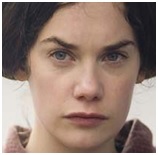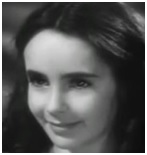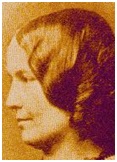|
 |
|
 |
Jane Eyre - Women, Ethics and Success
Jane Eyre (1847) Written by the English novelist, Charlotte Brontë (1816-55), pictured right.
Fun facts
What about film versions? Probably the most famous is the 1943 film starring Orson Welles as Rochester and Joan Fontaine as Jane (the poster is pictured below). Lots of other films have been made (including 1934, 1970, 1996 and 2011). The BBC has made several adaptations, the latest in 2006, starring Toby Stephens as Rochester and Ruth Wilson as Jane.
Key characters Jane Eyre, the story’s narrator and heroine Rochester, rich aristocrat St. John Rivers, Church of England minister
The story Orphaned Jane Eyre lives with her wealthy but cruel aunt, Mrs Reed, and her three bullying daughters. But strengthened by her friendship with Bessie, the nursemaid, she repeatedly stands up for herself against them. She is sent to Lowood, a boarding school, owned by the cruel Mr Brocklehurst. She befriends:
The appalling conditions are greatly improved after Helen’s death from typhus and Brocklehurst’s dismissal for embezzling school funds. Jane stays on to become an assistant teacher but becomes a governess at Thornfield Hall, when Miss Temple leaves to marry. Her pupil is a French girl, Adèle, the ward of her boss, Edward Rochester. She likes the job and Rochester is attracted by her wit and intelligence. She saves him from a fire and a
mysterious lady in the house, Grace Poole, is suspected of starting it. She misses Rochester (pictured right in the 2006 BBC adaptation) when she visits a dying Mrs Reed, who reveals a three-year-old letter from Jane’s uncle, John, about his desire to adopt her. Rochester tries to make her jealous by pretending to marry the beautiful and wealthy, Blanche Ingram. He finally proposes and Jane accepts. But, during their wedding, Richard Mason reveals that Rochester is already married to his sister, Bertha Mason. She is the mad woman locked up in Rochester’s attic, helped by her servant, Grace Poole. Rochester pleads with Jane to go abroad as his mistress, but she flees, wandering destitute and hungry for days. She is finally helped by a clergyman, St. John Rivers, and his sisters, Diana and Mary. He gives her a job as the village schoolmistress under her new name of Jane Elliott. But the discovery of her real name leads him to find out she is their cousin and has inherited a fortune from her uncle. She shares her fortune equally with the Rivers but rejects a marriage proposal from the unloving St John who
wants her to accompany him on his missionary work in India. Her newly found inheritance and social status give her the confidence to return to Rochester. She discovers his house has been burned down by his wife , who is killed. Rochester loses his sight and right hand, trying to save her. But Jane still accepts his proposal. Rochester recovers the sight of one eye to see their firstborn son. They live very happily (pictured right together in the 2011 film) and the novel ends with St John Rivers’ death.
Lessons for women, ethics and success 1. Women are the equal of men Jane (Charlotte Gainsbourg, pictured right, in the 1996 film):
“I am better than you - let me go!”, she tells Rochester after finding out that he's married. So she:
2. Relationships are happiest as equal partnerships Jane and Rochester (pictured right in the 1943 film) are happy because they are friends with
She isn’t afraid to criticize his weaknesses (like selfish chauvinism), so that he can improve himself.
3. Looks aren’t everything Unlike Blanche Ingram, Jane isn’t pretty, but Rochester is seduced by her
She loves him just as much after he is disabled and disfigured by the fire.
4. Money is marvellous Jane’s inheritance gives her:
Jane (Ruth Wilson) is pictured right in the 2006 BBC adaptation.
5. Duty must accompany desire Jane can only marry Rochester, if she accepts the responsibility of being his nursemaid. But her rejection of St John Rivers shows her belief that love is always more important than duty. 6. Love people, but fight for justice Helen Burns (a young Elizabeth Taylor, pictured right, in the 1934 film) is kind and forgiving, even towards a bullying teacher. Jane:
“Conventionality is not morality”, as Charlotte Brontë wrote in the book’s preface.
7. Hate hypocrisy Mr Brocklehurst and Mrs Reed preach Christianity but don’t practise its belief in love. 8. Religion should be a comfort, not a burden Charlotte Brontë (pictured right in 1854) believed that the aim of religion should be “offering comfort, not fiercely enforcing a duty”. This is the opposite of St John Rivers’ religion which replaced love with
9. Be true to yourself Jane doesn't live with Rochester as his lover, because this goes against her religious principles. She has self-respect, because she fights for her
“I care for myself”, she tells Rochester. Jane (Susannah York) and Rochester (George C. Scott) are pictured right in the 1970 film.
Key quote on religion “Conventionality is not morality. Self-righteousness is not religion”, Charlotte Brontë (in the preface)
Key quote on marriage Reader, I married him, Jane
Key quote on decision making Human beings ... must have action; and they will make it, if they cannot find it, Jane
Key quote on education Prejudices, it is well known, are most difficult to eradicate from the heart whose soul has never been loosened or fertilized by education, Jane
Key quotes on love He made me love him without looking at me, Jane (on Rochester). If people were always kind and obedient to those who are cruel and unjust, the wicked people ... would never feel afraid, and so they would never alter, Jane It is not violence that best overcomes hate, Helen Burns
Key quotes on relationships Life appears to be too short to be spent in pursuing animosity, or registering wrongs, Helen Burns
Key quote on peace of mind “A memory without blot or contamination must be an exquisite treasure”, Rochester
Key quote on women Women feel just as men feel; they need exercise for their faculties and a field for their efforts.
Key quote on motivation Most things free-born will submit to anything for a salary, Rochester.
Two literature websites to recommend 1. sparknotes.com 2. litcharts.com
A big thank you to... The BBC for the pictures. |
|
|
||
|
|
|
||
|
||
| Copyright © wisdomtowin.com All Rights Reserved | ||
|

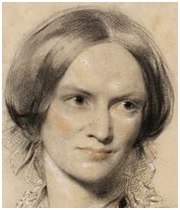
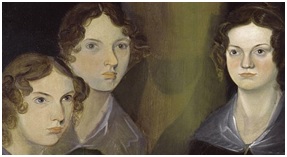
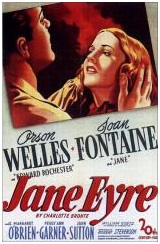
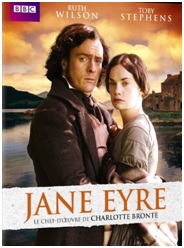
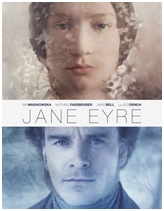
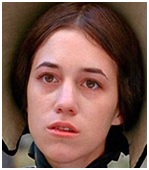
-jane-joan-fontaine-44film.jpg)
